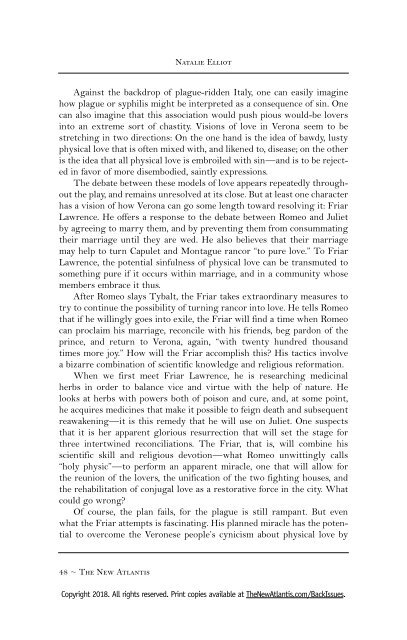The New Atlantis - Winter 2018 (Issue 54) uncompressed with cover
You also want an ePaper? Increase the reach of your titles
YUMPU automatically turns print PDFs into web optimized ePapers that Google loves.
Natalie Elliot<br />
Against the backdrop of plague-ridden Italy, one can easily imagine<br />
how plague or syphilis might be interpreted as a consequence of sin. One<br />
can also imagine that this association would push pious would-be lovers<br />
into an extreme sort of chastity. Visions of love in Verona seem to be<br />
stretching in two directions: On the one hand is the idea of bawdy, lusty<br />
physical love that is often mixed <strong>with</strong>, and likened to, disease; on the other<br />
is the idea that all physical love is embroiled <strong>with</strong> sin — and is to be rejected<br />
in favor of more disembodied, saintly expressions.<br />
<strong>The</strong> debate between these models of love appears repeatedly throughout<br />
the play, and remains unresolved at its close. But at least one character<br />
has a vision of how Verona can go some length toward resolving it: Friar<br />
Lawrence. He offers a response to the debate between Romeo and Juliet<br />
by agreeing to marry them, and by preventing them from consummating<br />
their marriage until they are wed. He also believes that their marriage<br />
may help to turn Capulet and Montague rancor “to pure love.” To Friar<br />
Lawrence, the potential sinfulness of physical love can be transmuted to<br />
something pure if it occurs <strong>with</strong>in marriage, and in a community whose<br />
members embrace it thus.<br />
After Romeo slays Tybalt, the Friar takes extraordinary measures to<br />
try to continue the possibility of turning rancor into love. He tells Romeo<br />
that if he willingly goes into exile, the Friar will find a time when Romeo<br />
can proclaim his marriage, reconcile <strong>with</strong> his friends, beg pardon of the<br />
prince, and return to Verona, again, “<strong>with</strong> twenty hundred thousand<br />
times more joy.” How will the Friar accomplish this? His tactics involve<br />
a bizarre combination of scientific knowledge and religious reformation.<br />
When we first meet Friar Lawrence, he is researching medicinal<br />
herbs in order to balance vice and virtue <strong>with</strong> the help of nature. He<br />
looks at herbs <strong>with</strong> powers both of poison and cure, and, at some point,<br />
he acquires medicines that make it possible to feign death and subsequent<br />
reawakening — it is this remedy that he will use on Juliet. One suspects<br />
that it is her apparent glorious resurrection that will set the stage for<br />
three intertwined reconciliations. <strong>The</strong> Friar, that is, will combine his<br />
scientific skill and religious devotion — what Romeo unwittingly calls<br />
“holy physic” — to perform an apparent miracle, one that will allow for<br />
the reunion of the lovers, the unification of the two fighting houses, and<br />
the rehabilitation of conjugal love as a restorative force in the city. What<br />
could go wrong?<br />
Of course, the plan fails, for the plague is still rampant. But even<br />
what the Friar attempts is fascinating. His planned miracle has the potential<br />
to overcome the Veronese people’s cynicism about physical love by<br />
48 ~ <strong>The</strong> <strong>New</strong> <strong>Atlantis</strong><br />
Copyright <strong>2018</strong>. All rights reserved. Print copies available at <strong>The</strong><strong>New</strong><strong>Atlantis</strong>.com/Back<strong>Issue</strong>s.


